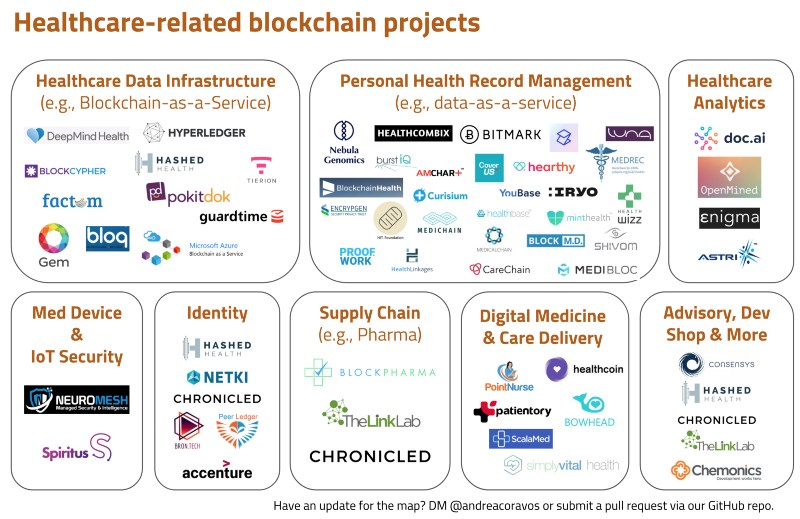F020 Blockchain, value of data, and the role of legislation with adoption (Ray Dogum, Health…
By October 2018, there were more than 150 projects applying blockchain to various healthcare issues, many of them in the public eye due to the boom of crowdfunding efforts with cryptocurrencies in the so-called ICOs (Initial Coin Offerings). Some projects such as Patientory, Shivom, MedicalChain successfully raised millions, other projects are still preparing for their ICO, some projects failed, and some shifted to more traditional ways of raising investments for theirs.
As the blockchain experts would say — the market is developing as expected.
Gartner blockchain hype cycle:
Innovation Trigger (2014–2015)
The peak of Inflated Expectations (2016 to 2020)
The trough of disillusionment (2021 to 2030)
The plateau of productivity (after 2030)
Among the people following the healthcare blockchain landscape more closely is Ray Dogum — the host of Health Unchained — podcast focused on blockchain projects and implementation in healthcare. Ray’s background is in Health Sector Management and currently, Ray is a project manager at American Well, a telehealth company in Boston.
The discussion in the 20th episode of Faces of digital health resolved around the landscape of healthcare blockchain projects in 2018, when can we expect practical implications, what will be the role of legislation in the blockchain adoption, and how genomics research, AI and blockchain make a good combination.
Listen to the podcast on Podbean, Stitcher, iTunes or wherever you get your podcast.
According to Ray’s observations CEOs of blockchain startups share a lot of optimism, however, many of them seem to lack the knowledge about the healthcare complexity. At the moment, very few projects can show minimum viable products, but this simply proves the technology is in the early stages marked mostly by research.
The potentials, however, are still there.
A FirstWord FutureViews Report about blockchain and the pharmaceutical industry reports the integration of blockchain promises operational efficiency and cost savings, which are underlying objectives within an effective pharma business model. In clinical trials, one of the critical opportunities blockchain data-sharing capabilities offers is in the recruitment and selection of patients, if the patient’s EHRs are connected to the blockchain. If blockchain would be enforced in clinical trials, negative results couldn’t be as easily hidden as they are today.
According to the not-for-profit organization The Pistoia Alliance, 60% of pharmaceutical and life science professionals are either using or experimenting with blockchain today, compared to 22% when asked in 2017.
However, 40% are not currently looking at implementing, or have no plans to implement blockchain, according to the survey of 170 senior pharma and life science professionals this year.
The biggest barriers identified to adoption are access to skilled blockchain personnel (55%), and that blockchain is too difficult to understand (16%).
Allready in 2011 the World Economic Forum market personal data as a new asset class.
For the patients, blockchain brings hope that they — not only the IT vendors or the pharma industry — could own their medical data and profit from it.
The way we view data today is going to radically change in terms of ownership, says Ray. In the future, we will have more autonomy and will not to have to give away our data ownerships right to intermediaries. Until we get there though, one of the key things blockchain solutions need to figure out is the user experience and managing private keys. Unlike passwords for our social media or email services, private keys can’t be easily recovered if lost.
Some of the questions addressed:
Half serious — how much do you think blockchain can improve mortality or aging?
How can genomics and AI research benefit from blockchain technology?
What’s your take on the current blockchain healthcare landscape? How many startups gave up on ICOs and what does this mean for new business models dependants of the token economics?
Will legislation play a crucial part in blockchain adoption in healthcare, similarly as financial incentives had to be put in place in the USA for the uptake of EHR adoption?

